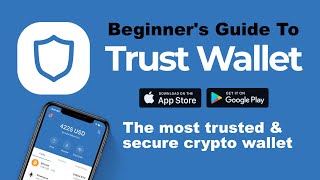Trust Wallet is a leading decentralized, multi-currency wallet that Trust wallet empowers users to securely store, manage, and interact with their cryptocurrency assets. Founded in 2017 by Viktor Radchenko, Trust wallet has grown into one of the most popular wallets in the blockchain ecosystem. It was acquired by Binance, one of the world’s largest cryptocurrency exchanges, in 2018. Trust Wallet stands out for its simplicity, robust security features, and wide-ranging support for cryptocurrencies and decentralized applications (DApps).
Features of Trust Wallet
1. Multi-Currency Support
Trust Wallet is renowned for its extensive compatibility with over 4.5 million cryptocurrencies and tokens across more than 65 blockchains. From mainstream coins like Bitcoin (BTC) and Ethereum (ETH) to lesser-known tokens and NFTs, the wallet offers comprehensive asset management.
2. Decentralized and Secure
Trust Wallet is a non-custodial wallet, meaning users retain full control of their private keys. The private keys are stored locally on the user’s device, ensuring that only the wallet owner has access to their funds. This approach eliminates the risk of centralized breaches that often plague custodial wallets.
3. User-Friendly Interface
The wallet boasts an intuitive design, making it accessible for both beginners and experienced cryptocurrency users. Its clear layout and straightforward navigation allow users to manage their portfolios with ease.
4. Integration with Decentralized Applications (DApps)
Trust Wallet has a built-in Web3 browser that lets users interact with decentralized applications directly within the wallet. This feature supports decentralized finance (DeFi) platforms, NFT marketplaces, and blockchain-based games, enhancing the wallet’s versatility.
5. Staking and Earning
Users can stake a variety of cryptocurrencies directly through the wallet to earn passive income. Trust Wallet supports staking for assets like Binance Coin (BNB), Tron (TRX), and Cosmos (ATOM), among others.
6. NFT Support
Trust Wallet provides support for non-fungible tokens (NFTs) on Ethereum and Binance Smart Chain. Users can store, view, and manage their digital collectibles conveniently.
7. Multi-Platform Accessibility
While primarily a mobile wallet, Trust Wallet is also available as a browser extension, ensuring accessibility for users across devices.
8. One-Click DEX Integration
The wallet integrates with decentralized exchanges (DEXs), enabling users to trade cryptocurrencies without leaving the app. Popular integrations include PancakeSwap, Uniswap, and SushiSwap.
How to Use Trust Wallet
1. Downloading and Installing
Trust Wallet is available on both iOS and Android platforms. Users can download the app from the App Store or Google Play Store.
2. Setting Up the Wallet
- Create a New Wallet: Upon installation, users can create a new wallet by generating a unique seed phrase. This phrase acts as a recovery tool and must be stored securely.
- Import an Existing Wallet: Users can also import existing wallets by entering the seed phrase or private key.
3. Adding and Managing Assets
Trust Wallet automatically detects supported tokens, but users can manually add custom tokens by providing the token’s contract address.
4. Sending and Receiving Cryptocurrency
- To Send: Enter the recipient’s wallet address and specify the amount.
- To Receive: Share your public address or QR code with the sender.
5. Interacting with DApps
Using the built-in DApp browser, users can explore various decentralized applications for trading, staking, lending, and more.
Security and Privacy
Trust Wallet employs several robust security measures:
- Non-Custodial Structure: Private keys are stored locally, giving users complete control over their funds.
- Encrypted Seed Phrase: Users must securely store their 12- or 24-word recovery phrase, which is crucial for wallet restoration.
- Biometric Authentication: The app supports fingerprint and facial recognition for an added layer of protection.
Advantages of Trust Wallet
- Decentralized Control: Users are the sole custodians of their private keys.
- Wide Asset Support: Compatible with a vast array of cryptocurrencies and tokens.
- Ease of Use: Simplifies asset management with a clean and intuitive interface.
- DApp Integration: Expands functionality beyond just storage to include seamless interaction with the blockchain ecosystem.
- Free to Use: The wallet has no hidden fees, with users only paying blockchain transaction fees.
Limitations of Trust Wallet
- Mobile-Centric: Primarily designed for mobile users, which may not appeal to desktop-focused traders.
- Dependent on User Responsibility: As a non-custodial wallet, users are solely responsible for safeguarding their seed phrases and private keys.
- Limited Customer Support: Lacks direct customer support, relying instead on an extensive knowledge base and community forums.
Conclusion
Trust Wallet is a powerful tool for managing cryptocurrency assets, offering a blend of security, accessibility, and versatility. Whether you’re a seasoned trader or a newcomer to the blockchain world, Trust Wallet provides an ideal solution for decentralized asset management. Its commitment to privacy, paired with features like staking and DApp integration, makes it a leading choice in the crypto ecosystem.
By putting control in the hands of users, Trust Wallet stays true to the core principles of blockchain technology: decentralization, transparency, and autonomy.


